Nelson Mandela: a timeline
Compiled by Mary Alexander
A comprehensive timeline of the life of Nelson Rolihlahla Mandela activist, political
prisoner, president of South Africa, statesman and world icon of peace and justice.
Scroll or click down to:
1910s
18 July 1918 Nelson Mandela born in Mvezo, Eastern Cape
province, South Africa. His mother, Nosekeni Fanny, was one of four wives of his
father, Gadla Henry Mphakanyiswa.
1920s
1925
Begins primary school near his home village of Qunu,
where a teacher unable to pronounce his African name of Rolihlahla gives him the
name "Nelson" in honour of British naval hero Admiral Horatio Nelson.
1927 His father Gadla Henry Mphakanyiswa dies; he becomes
the ward of the Tembu regent, Paramount Chief Jongintaba Dalindyebo.
1930s
1934 At the age of 16, Mandela undergoes the Xhosa initiation
and circumcision ritual. Enrols in the Clarkebury Boarding Institute in Engcobo.
1937 Enrols in Healdtown, the Wesleyan college in the Eastern
Cape town of Fort Beaufort.
1939 Enrols at the University College of Fort Hare in Alice,
Eastern Cape, for a bachelor of arts degree.
1940s
1940 Expelled from university for joining
in a protest boycott.
1941 Fleeing an arranged marriage, Mandela moves to
Johannesburg and works briefly as a night watchman on a gold mine.
1941 Meets Walter Sisulu, an active member of the African
National Congress (ANC), South Africa's major anti-apartheid liberation movement and
today the country's ruling party. Sisulu recommends Mandela for employment as an
articled clerk at the law firm Witkin, Sidelsky and Eidelmana, and the two become
firm friends.
1942 Begins to attend ANC meetings.
1942 Completes his bachelor of arts degree by correspondence
through the
University of South Africa.
1943 Enrols for an LLB postgraduate law degree at the
University of the Witwatersrand.
1944 Founds the ANC Youth League together with Anton
Lembede, Oliver Tambo and Walter Sisulu.
1944 Marries Evelyn
Ntoko Mase, his first wife.
1946 First son Madiba Thembekile (Thembi) born to Evelyn
Mase.
1947 First daughter and second child Makaziwe born to Evelyn
Mase; the baby died
nine months later.
1948 Elected national secretary of the ANC Youth League.
1948 Whites-only electorate votes the racist National Party into
power in South Africa. Apartheid becomes official government policy.
17 December 1949 The ANC adopts its Programme of Action,
inspired by the Youth League, which advocates the weapons of boycott, strike, civil
disobedience and non-cooperation with authority.
1950s
26 June 1950 The government passes the Suppression of
Communism Act, which formally bans the South African Communist Party and
proscribes the ideology of communism, defined by the
government as any scheme
aimed "at bringing about any political, industrial, social, or economic change within
the Union by the promotion of disturbance or disorder" or encouraging "feelings of
hostility between the European and the non-European races".
1950 Mandela's second son and third child Makgatho born to
Evelyn Mase.
1951 Elected president of the ANC Youth League.
1952 ANC launches the Campaign for Defiance of Unjust Laws.
Mandela is elected as the ANC's national volunteer-in-chief and travels South Africa
organising resistance.
1952 Arrested and tried with Walter Sisulu and 18 others under
the Supression of Communism Act for his role in the campaign. Sentenced to nine
months' imprisonment with hard labour, suspended for two years.
1952 Elected president of the Transvaal region of the ANC, and
as the first of ANC deputy
presidents.
1952 Opens South Africa's first black-owned law firm in
downtown Johannesburg in partnership with Oliver Tambo.
1953 Devises the M-Plan - or Mandela Plan - for the ANC's future
underground operations.
1953 Second daughter and fourth child born to Evelyn Mase, and
named Makaziwe in honour of her dead infant sister.
26 June 1955 The Congress of the People, and alliance on anti-
apartheid movements that includes the ANC, adopts the Freedom Charter at Kliptown
in Soweto. The charter declared fundamental tenets of a free South Africa, such as
"South Africa belongs to all who live in it, black and white, and that no government
can justly claim authority unless it is based on the will of all the people".
5 December 1956 Mandela and 150 others arrested and charged
with treason. The marathon Treason Trial of 1956 to 1961 followed, with all
defendants eventually being found not guilty.
1958 Mandela divorces Evelyn Mase and marries Winnie
Madikizela.
1959 Third daughter and fifth child Zenani (Zeni) born to Winnie
Madikizela-Mandela.
1959 The Africanist faction of the ANC breaks away to form the
Pan Africanist
Congress under the leadership of Robert Sobukwe and Potlako Leballo.
1960s
21 March 1960 Police open fire on a peaceful demonstration
against the pass laws organised by the PAC in the township of Sharpeville, killing 69
people - many of them shot in the back. The reaction is immediate, with
demonstrations, protest marches, strikes and riots across South Africa.
30 March 1960 The South African government declares a state of
emergency, detaining more than 18 000 people, and banning the ANC and other
liberation movements.
1960 Fourth daughter and sixth child Zindziswa (Zindzi) born to
Winnie Madikizela.
1961 The Treason Trial ends with an acquittal for Mandela and
his co-defendants.
1961 The ANC decides to move from nonviolent to violent means
of opposing apartheid. The movement's armed wing, Umkhonto weSizwe ("Spear of
the Nation"), is formed, with Mandela as commander-in-chief.
1961 In the face of government repression, Mandela goes
underground, becoming a master of disguise and managing to evade arrest with such
success the media nicknames him the Black Pimpernel.
5 August 1962 After travelling abroad, and being on the run for
17 months, Mandela is arrested near Howick in Natal and imprisoned in the
Johannesburg Fort. He is charged for unlawfully exiting the country and for incitement
to strike.
25 October
1962 Mandela is convicted and sentenced to five
years on Robben Island, the notorious political prison off the coast near Cape Town.
11 July 1963 While Mandela is in prison, police arrest prominent
ANC leaders at their hideout on Liliesleaf Farm in Rivonia, north of Johannesburg.
1963 Mandela and his arrested ANC comrades are charged with
sabotage and other crimes in the Rivonia Trial.
20 April 1964 At the opening of the defence case at the Pretoria
Supreme Court, Mandela makes his famous Statement at the Rivonia Trial, in which
he lays out the reasoning in the ANC's choice to use violence. In his conclusion to the
statement, Mandela says: "I have cherished the ideal of a democratic and free society
in which all persons live together in harmony and with equal opportunities. It is an
ideal which I hope to live for and to achieve. But if needs be, it is an ideal for which I
am
prepared to die."
12 June 1964 The Rivonia Trial ends with Mandela and all his co-
accused - excluding Rusty Bernstein - being found guilty and sentenced to life
imprisonment. Mandela is sent to Robben Island. As a D-group prisoner, the lowest
classification, he is allowed one visitor and one letter every six months.
1965 Mandela's book
No Easy Walk to Freedom is
published by Heinemann.
1969 Plot to spring Mandela from jail is infiltrated by secret
agent Gordon Winter on behalf of South African intelligence, who want the prisoner to
escape so they can shoot him during recapture. The plot is foiled by British
Intelligence.
1969 Oldest son Thembi Mandela dies in a car crash, aged 25.
Mandela, on Robben Island, was not allowed to attend the funeral.
1969 Winnie Madikizela-Mandela jailed at Pretoria Central
Prison, where she will spend
the next 18 months in solitary confinement.
1970s
1973 Daughter Zenani Mandela marries Prince Thumbumuzi
Dlamini, elder brother of King Mswati III of Swaziland.
1973 A nuclear particle discovered by University of Leeds
scientists is named the "Mandela particle".
16 June 1976 In Soweto, South African police open fire on
schoolchildren protesting against the use of Afrikaans as a medium of instruction. The
Soweto uprising begins, quickly spreading across South Africa and leaving huge
damage to property and loss of life in its wake. In response, a significant number of
black youngsters leave South Africa to join the ANC's forces in neighbouring countries.
1980s
March 1982 Mandela is transferred from Robben Island to
Pollsmoor Prison in
Cape Town, along with other ANC leaders Walter Sisulu, Andrew
Mlangeni, Ahmed Kathrada and Raymond Mhlaba. It is speculated that this is to
remove their influence on a new generation of young black activists imprisoned on
Robben Island.
26 June 1983 Sculpture in a city park by Elisabeth Frink
dedicated to Mandela unveiled in Dublin, Ireland. As second sculpture was unveiled in
Dublin a year later.
20 August 1983 - The United Democratic Front (UDF), a coalition
of about 400 civic, church, students', workers' and other organisations, formed to fight
apartheid inside South Africa. With the slogan "UDF unites, apartheid divides", its 3-
million members were a powerful force in the internal anti-apartheid struggle.
1984 English ska band The Special AKA release the song "Free
Nelson Mandela",
which reaches number nine on the British charts. The song was banned in South
Africa, but bootleg
tracks found their way into many parties.
February 1985 President PW Botha offers to free Mandela on
condition that he unconditionally rejects violence as a political weapon. Mandela
spurns the offer, saying in a statement: "What freedom am I being offered while the
organisation of the people remains banned? Only free men can negotiate. A prisoner
cannot enter into contracts."
28 October 1985 Statue of Mandela unveiled in London by Oliver
Tambo, exiled president of the ANC.
November 1985 Minister of Justice and Prisons Kobie Coetsee
meets Mandela in Volks Hospital in Cape Town, where Mandela is recovering from
prostate surgery. This is the first meeting between Mandela and the National Party
government and is followed by a series of tentative meetings that lay the groundwork
for future negotiations. But little real progress is made.
1985 Stevie Wonder dedicates his
Oscar for the song "I Just
Called to Say I Love You" to Mandela. His music is then banned by the South African
Broadcasting Corporation.
9 January 1987 Mandela becomes the first person to be awarded
the freedom of the city of Sydney, Australia.
1988 Mandela is transferred from Pollsmoor Prison to Victor
Verster Prison near Paarl in the Western Cape. Various restrictions are lifted, and
friends and family are able to meet him.
1988 The Nelson Mandela 70th Birthday Tribute concert held at
London's Wembley Stadium. It was a focal point of the external anti-apartheid
movement, with prominent musicians - including Simple Minds, Santana, Tracy
Chapman, Salif Keita, Annie Lennox and Whitney Houston - voicing their support for
Mandela.
1989 President PW Botha Botha suffers a stroke and is replaced
by FW de Klerk.
1990s
2 February 1990 President FW de Klerk announces Mandela and
other political
prisoners will be released and the ANC and other resistance movements unbanned.
11 February 1990 In the full glare of international media
attention, Mandela walks free from Pollsmoor Prison in Cape Town.
4 May 1990 Negotiations to end apartheid between the ANC and
the government begin at the presidential residence, Groote Schuur. They issue the
Groote Schuur Minute, a joint commitment to resolve the existing climate of violence
and intimidation and to remove practical obstacles to negotiation, including indemnity
from prosecution for returning exiles and the release of political prisoners.
6 August 1990 The ANC and the government extend their
consensus in the Pretoria Minute, which includes the suspension of the armed struggle
by the ANC's military
wing, Umkhonto weSizwe.
1991 The first national conference of the ANC held inside South
Africa in decades
elects Mandela as president of the party. Oliver Tambo, the previous president,
becomes national chairperson.
20 August 1991 The United Democratic Front is disbanded.
14 September 1991 The National Peace Accord is signed by
representatives of 27 political organisations and national and homeland governments,
preparing the way for the Convention for a Democratic South Africa (Codesa)
negotiations.
20 December 1991 Plenary session of Codesa at the World Trade
Centre in Kempton Park, near Johannesburg.
18 March 1992 After the National Party begins to lose by-
elections to the pro-apartheid Conservative party, a referendum of white voters is
held to determine if FW de Klerk has their mandate to end apartheid. An
overwhelming 68% votes
"yes", allowing negotiations to proceed.
April 1992 Mandela and Winnie Madikizela-Mandela separate.
May 1992 Codesa II begins the second round of negotiations.
17 June 1992 The Boipatong massacre. During the night, a
heavily armed band of Inkatha Freedom Parties raid the Vaal township of Boipatong
and kill 46 people. Mandela accuses the government of complicity in the atrocity and
withdraws the ANC from negotiations. The ANC instead takes to the streets with a
programme of "rolling mass action".
7 September 1992 The army of the spurious "homeland" of
Ciskei opens fire on protest marchers near Bisho, killing 28. The Bisho massacre
brings a new urgency to the search for a political settlement.
26 September 1992 Negotiations resume when the government
and ANC agree on a Record of Understanding dealing with a constitutional assembly,
an interim
government, political prisoners, hostels, dangerous weapons and mass
action.
1 April 1993 The Multiparty Negotiating Forum (MPNF) gathers
for the first time, with political groupings on the more extreme right and left taking
part, as well as traditional African leadership.
10 April 1993 Chris Hani, the leader of the South African
Communist Party and a senior member of the ANC, is assassinated outside his home
by right-wingers intent on derailing negotiations. Instead, faced with a country on the
brink of civil war, the main parties pushed for a settlement with increased
determination. Polish far-right immigrant Janusz Waluś and senior Conservative Party
leader Clive Derby-Lewis are later jailed for life for the crime.
4 July 1993 US President Bill Clinton presents Mandela with the
Philadelphia Liberty Medal.
18 November 1993 The MPNF ratifies the interim
Constitution in
the early hours of the morning. Thereafter, a Transitional Executive Council overees
the run-up to a democratic election.
10 December 1993 Mandela and FW de Klerk jointly awarded the
Nobel Peace Prize for their different roles in ending apartheid.
December 1993 Mandela is named Person of the Year by Time
Magazine, together with FW de Klerk, Yasser Arafat and Yitzhak Rabin.
27 April 1994 South Africa's first democratic elections are held,
and Mandela gets to vote for the first time in his life. The ANC wins 62% of the vote.
10 May 1994 Inaugurated as South Africa's first democratically
elected president.
1994 Publishes his autobiography,
Long Walk to
Freedom, which he started writing in prison. The book is an extended version
of his 1965 work
No Easy Walk to Freedom.
1995 The Truth
and Reconciliation Commission is set up in terms
of the Promotion of National Unity and Reconciliation Act. It is headed by Anglican
Archbishop Desmond Tutu.
1995 South Africa hosts, and wins, the Rugby World Cup. Rugby
was previously seen as a whites-only sport, but Mandela gave the country's team
much high-profile support. After the Springboks won an epic final over New Zealand,
Mandela presented the trophy to captain Francois Pienaar, an Afrikaner, wearing a
Springbok shirt with Pienaar's own number 6 on the back. This was widely seen as a
major step in the reconciliation of white and black South Africans.
14 December 1995 Receives Harvard Business School Statesman
of the Year Award.
March 1996 Mandela and Winnie Madikizela-Mandela divorce.
18 July 1998 On his 80th birthday Mandela marries Graηa Machel
(nιe Simbine), widow of Samora Machel, the president of
Mozambique until his death
in 1986.
2 September 1998 Appointed the 19th secretary-general of the
Non-Aligned Movement.
14 June 1999 Thabo Mbeki succeeds Mandela as president of
South Africa.
1999 Listed as one of the 100 most influential people of the 20th
century by Time magazine.
2000s
2000 The first Nelson Mandela Invitational charity golf
tournament, hosted by Gary Player, is played. It has since raised over R20-million
(US$2.8-million) for children's charities.
July 2001 Diagnosed and successfully treated for prostate
cancer.
2001 Mandela becomes the first living person to be made an
honorary Canadian citizen.
9 July 2002 US President George W Bush awards Mandela the
Presidential Medal of Freedom, the United States'
highest civilian award, in
Washington.
2003 Mandela lends his name to the
46664 Aids awareness and fundraising campaign,
named for his former prison number.
2003 Mandela's death prematurely announced by CNN when his
pre-written obituary, along with those of several other famous figures, was
inadvertently published on the channel's website.
31 March 2004 Sandton Square in Johannesburg is renamed
Nelson Mandela Square with the unveiling
of a six-metre bronze statue.
June 2004 Aged 85, Mandela announces that he will be
retiring from public life. Citing failing
health and the need to spend more time with his family, he said he wanted to be in a
position of "calling you to ask whether I would be welcome, rather than being called
upon to do things
and participate in events. My appeal therefore is: Don't call me, I
will call you".
2004 Mandela's first wife Evelyn Mase dies.
6 January 2005 Oldest living son
Makgatho Mandela dies of Aids, aged 54.
22 May 2006 New Statesman places Mandela at number two on
its list of 50
"Heroes of our
time". At number one was Aung San Suu Kyi, the Burmese pro-democracy
campaigner.
18 July 2007 On Mandela's 89th birthday, he, Graηa Machel and
Desmond Tutu
convene The Elders, a
grouping of world leaders set up to contribute their wisdom and independent
leadership to solving the world's toughest problems. Other members include Kofi
Annan, Ela Bhatt, Gro Harlem Brundtland, Jimmy Carter, Li Zhaoxing, Mary Robinson
and Muhammad Yunus.
29
August 2007 A
statue of Mandela is unveiled at Parliament Square in London by
Richard Attenborough, Ken Livingstone, Wendy Woods (the widow of Donald Woods)
and Gordon Brown.
18 July 2008 Mandela's
90th birthday is marked across the world, with the main South
African celebrations held at his home town of Qunu. A
concert in his honour is held in Hyde Park,
London.
27 August 2008 Statue of Nelson Mandela is unveiled at Groot
Drakenstein Correctional Centre near Paarl. Formerly known as Victor Verster, this is
the prison where Mandela spent the last of his 27 years in jail.
November 2009 The
UN
General Assembly announces that Mandela's birthday, 18 July, is to be known
internationally as Mandela Day.
2010s
26 January 2011 Mandela admitted to hospital with an acute
respiratory infection. An
international
media frenzy over the former president's health ensues. Three days later, on 28
January, he is discharged for treatment at his home in Houghton, Johannesburg.
21 June 2011 Mandela is
visited at home by American First Lady Michelle Obama and her
daughters Sasha and Malia.
18 July 2011 Mandela celebrates his
93rd birthday with his family in Qunu, Eastern Cape.
21 October 2011 Mandela is officially counted in South Africa's
Census 2011.
25 February 2012 He is admitted to hospital for an abdominal
complaint, and
discharged after one
night.
18 July 2012 Mandela
turns 94, and celebrates the day with his
family in Qunu.
November 2012 South Africa's new
banknotes featuring Nelson Mandela go into circulation.
18 December 2012 Mandela is
admitted to hospital to undergo tests. He is discharged on 26
December after treatment for a lung infection and gall stones, having spent the
longest period in hospital since his release from prison.
9 March 2013 Mandela is admitted to a Pretoria hospital for a
scheduled check-up.
28 March 2013 Again Mandela is admitted to hospital for
treatment of pneumonia. He is released nine days later, on 6 April.
8 June 2013 For the third time
in 2013, Mandela
spends time in hospital, receiving
treatment for his recurring lung problem.
17 June 2013 Graça Machel, Mandela's wife,
issues a statement thanking the world for
its support.
18 July 2013 Mandela celebrates his 95th birthday, while
continuing to receive treatment at a Pretoria hospital. Doctors describe his condition
as "stable but critical".
Birthday wishes pour in
from across the world.
1 September 2013 After almost three months in hospital,
Mandela
is discharged. A full medical
team would ensure that he received the same level of intensive care at his Houghton
home, President Jacob Zuma said.
 Nelson Mandela casts his vote in South Africa's first democratic elections, held on 27 April 1994 (Photo: African National Congress)
Nelson Mandela casts his vote in South Africa's first democratic elections, held on 27 April 1994 (Photo: African National Congress)
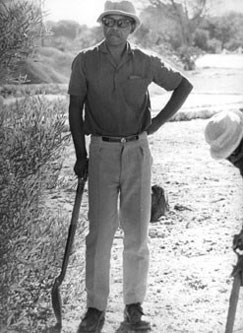
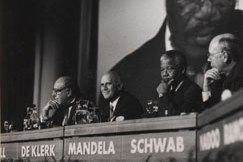
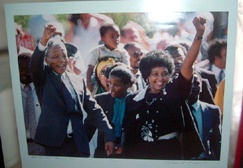 The famous photograph of Nelson Mandela and his second wife, Winnie, on his release from prison on 11 May 1990, on display at the Mandela House museum in Soweto. This was the first time the world had seen his face in over two decades.
The famous photograph of Nelson Mandela and his second wife, Winnie, on his release from prison on 11 May 1990, on display at the Mandela House museum in Soweto. This was the first time the world had seen his face in over two decades.
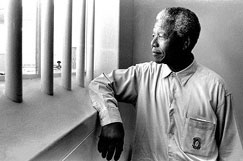 Veteran photographer Jόrgen Schadeberg documented Nelson Mandela's return visit to his Robben Island cell in 1994 (Photo strictly copyright Jόrgen Schadeberg)
Veteran photographer Jόrgen Schadeberg documented Nelson Mandela's return visit to his Robben Island cell in 1994 (Photo strictly copyright Jόrgen Schadeberg)
 On display at the Apartheid Museum in Johannesburg: the famous photo of Nelson Mandela congratulating Springbok captain Francois Pienaar after South Africa beat New Zealand to clinch the 1995 Rugby World Cup. Both men are wearing the number six captain's jersey.
On display at the Apartheid Museum in Johannesburg: the famous photo of Nelson Mandela congratulating Springbok captain Francois Pienaar after South Africa beat New Zealand to clinch the 1995 Rugby World Cup. Both men are wearing the number six captain's jersey.
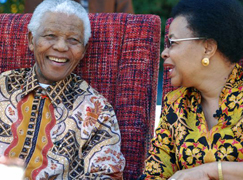 File photo of Nelson Mandela and his wife Graηa Machel, whom he married on his 80th birthday (Photo: Nelson Mandela Children's Fund)
File photo of Nelson Mandela and his wife Graηa Machel, whom he married on his 80th birthday (Photo: Nelson Mandela Children's Fund)
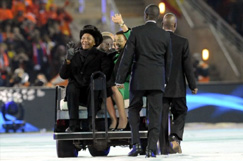 Nelson Mandela and his wife, Graca Machel, at the great man's last public appearance - the closing of the 2010 Fifa World Cup at the FNB Stadium, then known as Soccer City Stadium, in Johannesburg, 11 July 2010 (Photo: 2010 Fifa World Cup South Africa Organising Committee)
Nelson Mandela and his wife, Graca Machel, at the great man's last public appearance - the closing of the 2010 Fifa World Cup at the FNB Stadium, then known as Soccer City Stadium, in Johannesburg, 11 July 2010 (Photo: 2010 Fifa World Cup South Africa Organising Committee)







